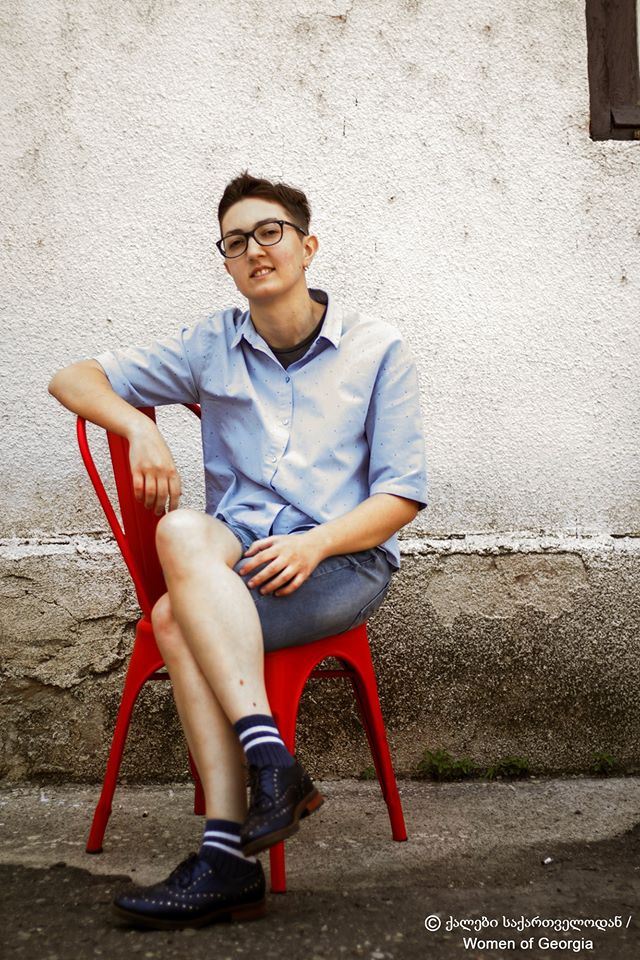Tamar Jakeli, 24 years old, Tbilisi
Before I turned 21, I spent 5 years in the USA – first I went there by FLEX, then I was given a scholarship and I stayed at the university. I’ve always been interested in activism in Georgia and I’ve been observing it from the US for years. So as soon as I came back, I immediately tried to get involved in activism, but while looking for a job, I found myself in the NGO sector. At first, I was excited about that and was motivated to go to work every day. But after a few months, I realized that my skills and resources were lost in the daily routine and in the hierarchy which was created in this organization. I was a project assistant and they made me feel like I was only there to do tasks, not to make any decisions. Therefore, my initiatives were never encouraged. Many left-wing activists like to say that everything’s “NGO-ized” and that extinguishes the potential for emancipatory activism. But I think it’s too generalized. In my opinion, NGOs are still quite different from each other. Where I worked, it was a hierarchical organization and from the very beginning, I felt I couldn’t fit into the organizational culture for many reasons. For example, when we, the colleagues, met for lunch, they talked about their husbands, their children, some of them already had grandchildren. I often had nothing to say. I couldn’t talk about my relationships with my partners, because I had the feeling that some of the senior staff weren’t ready to hear my stories about relationships with women. Only a few employees knew about my orientation. Some of them probably suspected something, but still talked about the May 17th in the lines of ‘’why are they protesting in the open? That’s why they’re being attacked – if only they stayed at home, nobody would care.’’ After such conversations, I no longer felt comfortable sharing anything about my life. In general, I open up to people very easily, but if I have to hide a part of my life from someone, then I can’t open up at all. Therefore, I couldn’t establish normal relationships with most of my colleagues in this organization.
In general, ‘’career growth’’ and ‘’success’’ is unclear concepts for me. My main motivation is to just do what I think is right and change things for the better. I’m an idealist and people often misunderstand this, thinking that I’m being vocal to help advance my career.
For the last two months before leaving this organization, I thought almost every day that something obviously had to be changed in my life. So, one day I sat down and calculated for how long would my savings last if I lived modestly. I realized, that it was probably enough for 5-6 months and I decided to quit my job. Suddenly, I felt so relieved that I realized that if I stayed, I would lose my self-respect. At the same time, my work output would also be affected, as I had completely lost motivation. On that day, when I left the office, I called my boss and told him that the next day I was writing a resignation letter and I was leaving the job in a month. This last month was the happiest I’ve ever been at this job.
 Ideological chaos in Georgian activism
Ideological chaos in Georgian activism
—————————————————————
I didn’t receive formal education on environmental issues, but I was always interested in it and felt that it was one of the topics that bothered me the most. I had a lot of information about the climate crisis and in general, our future life is up to us, especially my generation. If we don’t solve the environmental problems, nothing will matter anymore. If the planet is no longer a healthy place, how can we achieve social justice on a dead planet? Therefore, I wanted to work in a place where environmental issues, women’s and labor rights, as well as Queer issues intersected with each other. The ‘’young greens’’ seemed to me to be such a place back then. So, after I left the job, I started organizing climate strikes with this team. After that, there were strikes to protect the Digomi forest, which was successful, and the court ordered stopping all construction in this area. In short, as soon as I left work, I turned immediately to activism. I felt a lot of motivation and admiration for what I was doing. Back then I knew nothing about the internal dramas and struggles, which turned out, were happening in activism in general. In a few months, I saw that many people I respected individually turned out to dislike each other. Even though they stand together at the strike, in separate circles they talked trash about each other and so on. So, I was also curious about what they thought of me and how my activity was perceived. I slowly realized, that not everyone was kind to me. Especially when I was talking about my personal experiences, it was perceived as the experiences of a very privileged person. It happens that quite privileged people try to delegitimize people, who they think is also trying to become privileged. In fact, I consider myself a leftist, but it’s comical when more radical leftists call me a liberal and liberals call me a radical leftist.
In fact, I agree with progressive left-wing ideology. Due to ideological differences, I left the ‘’Greens’’ in May. It turned out that a large group of the organization placed class issues at the forefront, then came environmental issues, and only then feminist and Queer issues. For me, there isn’t any such hierarchy between these issues, and all these issues are equally important. Unfortunately, it turned out that what I didn’t like when working in the previous organization – hierarchy, aversion to different opinions, labeling people, and delegitimizing them – in a few months were exposed in the ‘’young greens’’ too.
We live in late capitalism. It’s better than to live in the hope of a revolution. We have to try reforming this system and find common ground with both the radical leftists and also with the liberals. Otherwise, we will be looking for an enemy among potential friends and I would rather look for a potential friend among enemies. We need to stand together around important issues, especially when we are fighting for the bare minimum in Georgia.
My vision for the development of the ‘’Greens’’ was to have our own strategy and to work constructively with whomever we crossed paths with. We would be more positive agenda makers if we worked this way. You can’t separate yourself from everyone and everything and constantly self-marginalize. In fact, not everything is black and white, the context and many nuances need to be considered.
For me, the individual comes first, and only then the team – I’m a person first, and only then do I unite around a common interest in any group, in which I stay only if I feel good as a person in that group – but this was also perceived negatively by a few people in the ‘’Greens’’. They said that the collective is more than the individual. For me, this is the way to totalitarianism. In General, ‘’Greens’’ actually has the most progressive ideology that I have ever encountered and I hope that it will not turn into a reactionary leftist movement. I’m going soon to Sweden for two years for a master’s degree. I have to study public ecology and come back armed with expertise. I believe that during my absence, this group will be able to look in the mirror and, based on feedback from its members, make a positive transformation.
 The Politics of visibility
The Politics of visibility
—————————————————————
When there are discussions if we should rally or if we should use profile pictures as a form of protest, I’m reminded of my experience. I remember my feelings in 2015 – after same-sex marriage was legalized in the US, I saw the rainbow-frames on many peoples’ profiles for the first time. Even though I came out to my mom and a few friends, I couldn’t use this frame myself. I saw this frame on many of my Facebook friends, who I didn’t realize were thinking about these topics and I was very happy. As it turned out, I had a circle of people more receptive than I could ever imagine. I remember I went through my entire list of friends, checking who had put up this colorful frame to learn with whom I could talk to about it. I have probably been expressing my views on these topics on social media for the last two or three years. I think that even if one person feels that he or she is not alone in this world, this colorful frame and everything else related to visibility is totally worth it.
Coming out to mom
—————————————————————
Before I told my mother about my identity, I constantly felt fear. It was very important to me that people close to me knew the truth about me, but I hadn’t imagined telling my mother so soon. I was in love for the first time when I was 17, but unlucky. I was sad for the whole months and I had to pretend I was happy when I was around my mother. It made me feel even worse and one day, when I didn’t even expect it, I told her. After that, we both cried for three hours. She took it very emotionally, she suffered a lot and blamed herself. She was looking for her ‘’guilt’’ in my identity, which was the hardest for me, especially when I had known since I was five years old that I like women. The acceptance process was quite long, but every summer when I came back from the USA, I felt more and more accepted by her. She needed time, but I think we should give our parents at that time. We shouldn’t take it so dramatically that information about our sexual orientation is not easily received. Our parents’ generation is interested in what the community around them thinks, and often, we can be more understanding of them than vice versa. I think this is the way to relatively harmonious relationships, not throwing them out of our lives altogether.
Author: Ida Bakhturidze
Photo: Nino Baidauri
Translation: Mariam Kajrishvili

